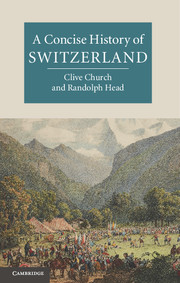Book contents
- Frontmatter
- Contents
- List of Illustrations
- List of Figures
- List of Maps
- Acknowledgements
- List of Abbreviations
- Introduction Making the Swiss
- 1 Before Switzerland
- 2 Creating the Swiss Confederacy, 1386–1520
- 3 A divided Switzerland in Reformation Europe, 1515–1713
- 4 The Ancien Régime, 1713–1798
- 5 Revolution and contention, 1798–1848
- 6 Forging the new nation, 1848–1914
- 7 The shocks of war, 1914–1950
- 8 The Sonderfall years, 1950–1990
- 9 Since 1989
- Chronology
- Glossary
- Further Reading
- Index
9 - Since 1989
A return to normality?
Published online by Cambridge University Press: 05 June 2013
- Frontmatter
- Contents
- List of Illustrations
- List of Figures
- List of Maps
- Acknowledgements
- List of Abbreviations
- Introduction Making the Swiss
- 1 Before Switzerland
- 2 Creating the Swiss Confederacy, 1386–1520
- 3 A divided Switzerland in Reformation Europe, 1515–1713
- 4 The Ancien Régime, 1713–1798
- 5 Revolution and contention, 1798–1848
- 6 Forging the new nation, 1848–1914
- 7 The shocks of war, 1914–1950
- 8 The Sonderfall years, 1950–1990
- 9 Since 1989
- Chronology
- Glossary
- Further Reading
- Index
Summary
The breaching of the Berlin Wall and the ensuing collapse of the Soviet empire ushered the Swiss into a new era, even if they were not always aware of it. Alterations in the context on which the Sonderfall rested and developing resistance to change began to turn the fissures in the Sonderfall into large cracks. The country found itself forced to rethink its armed neutrality, to cope with a surge in asylum applications and to devise new relations with a changing EU, all at a time of economic depression and painful scrutiny of the country’s Second World War record. These challenges stimulated a populist nationalist response, much like that found in other European countries. It was led by the Swiss People’s Party (SVP), which was opposed to international entanglements, whether with the United Nations or the EU, on the grounds of their incompatibility with the Sonderfall. The rise of populist nationalism led to government crises and controversial votations and elections that posed questions about the country’s future direction. Increasingly, the country faced a choice between adapting to outside demands or resisting change and maintaining the Sonderfall. Politics, in other words, became increasingly polarized and sometimes personalized.
All this put the system, and especially the government, under great pressure as it tried to navigate between the rocks of outside problems and the shoals of shifting domestic opinion. As a result, all the elements of the Sonderfall were threatened: the country’s foreign policy stance, its prosperity, its cohesion, its consensus politics, its policy successes and its memories of its role in the Second World War, along with its sense of identity. For some time, the populist response to these threats looked like fundamentally challenging the whole Swiss post-war system, but consensus reasserted itself often enough to prevent this, though it still left the country divided and uncertain. And, while such reverses as the country suffered were slight in comparison to problems elsewhere, they were still sufficient to worry the Swiss. In this, Switzerland became a more normal state, evolving in much the same way as its European neighbours.
- Type
- Chapter
- Information
- A Concise History of Switzerland , pp. 254 - 282Publisher: Cambridge University PressPrint publication year: 2013



